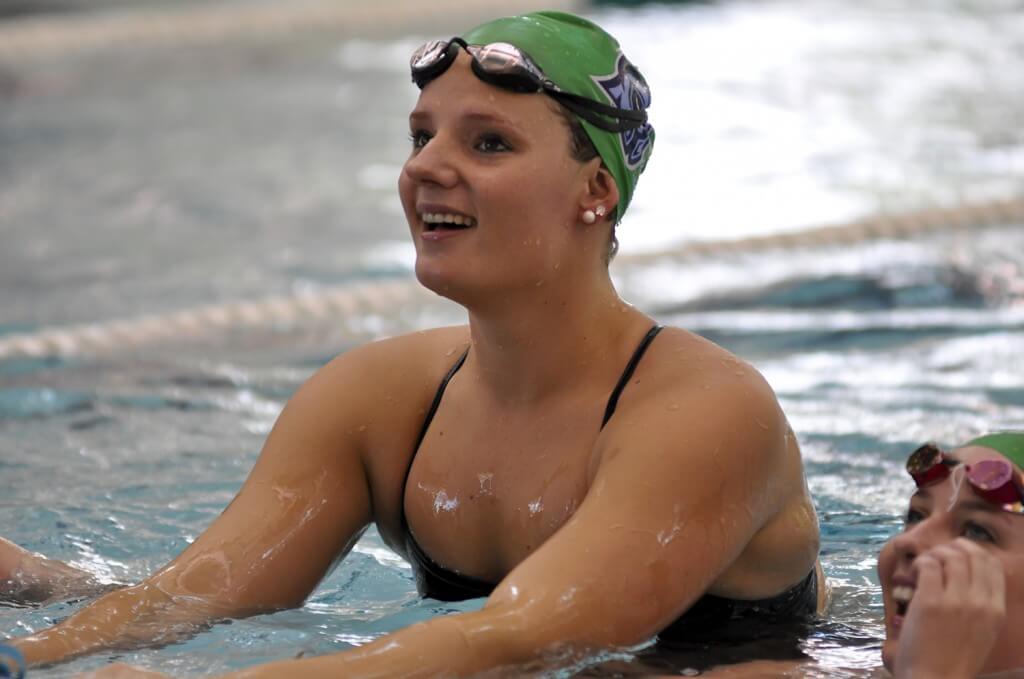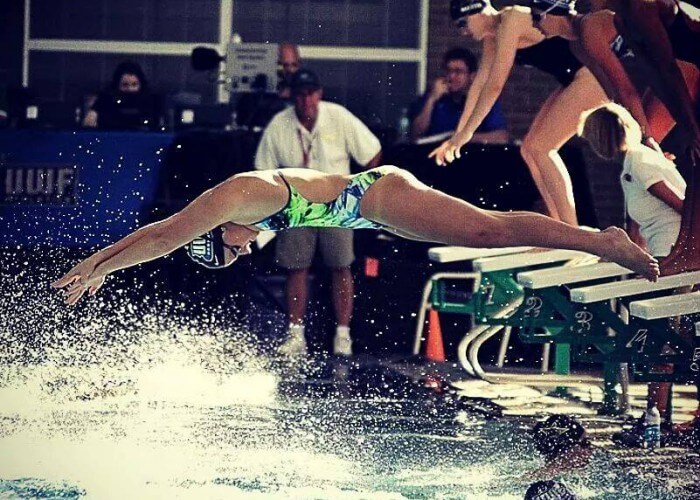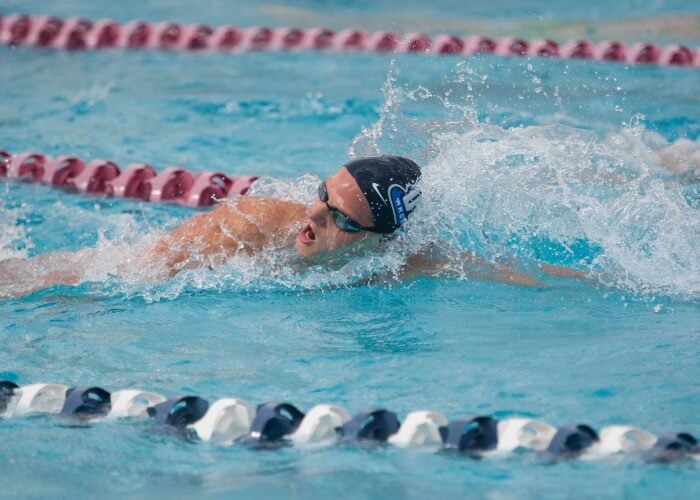Peggy de Villiers: Inspirational Deaf Swimmer

ARKADELPHIA- Junior Peggy de Villiers is one of the fastest members of the University of West Florida team. She also happens to be a deaf swimmer who has not let her hearing disability affect her attitude and competitive drive in the sport.
Growing up Deaf
De Villiers grew up in Somerset West, South Africa. When she was six months old she lost her hearing due to an illness called bacterial meningitis. People were quick to put a label on Peggy’s hearing disability when she was a child, however, the discrimination only started to become apparent when she was 12 years old.
“At the time, growing up with a hearing disability didn’t seem so challenging because, as a kid, you don’t see the negatives and you don’t compare,” de Villiers said. “But as I got older I started learning the advantages that other kids had, both in the classroom and in the pool.”
De Villiers wears a hearing aid and has adopted efficient communication skills with it on. She currently has about 30 percent of her hearing without the use of a hearing aid.
“People had always asked me what I was wearing and they would treat me differently because they thought that my communication was somehow distorted, although it was not,” de Villiers said.
Beginning Swimming
De Villiers started swimming at the age of 12 and has always been a strong, natural athlete. She competed on school and club swim teams until she left for the states in 2013.
During her high school swimming career, Peggy lettered all four years at Somerset College High School while recording a time of 22.98 in the 50 freestyle. She also set five individual Provincial Junior Swimming Records during this time.
Additionally, de Villiers was a member of the South Africa Deaflympics team since 2007 and holds the deaf world swimming record in the 50 meter backstroke at 31.11.
Swimming at UWF
De Villiers discovered University of West Florida online while searching for colleges with swimming programs in Florida.
“Ultimately it was my [UWF’s] coach, Andrew Hancock, that drew me to the school,” de Villiers said. “He sounded like he cared a lot about each swimmer’s needs.” The school’s beautiful facilities and location near the Gulf of Mexico was added incentive to attend college there.
Being partially deaf has affected Peggy’s swimming career mostly when she is physically in the pool and cannot wear her hearing aids.
“I cannot hear what coach communicates to us while training in the water and more often I don’t know what to do and just end up following my teammates,” de Villiers said.
However, coach Hancock has thoroughly enjoyed having Peggy as a part of his team and believes that a good communication system has been developed between them.
“I was somewhat surprised at how easy it was to work with Peggy in a swimmer/coach capacity given her disability,” Hancock affirmed. “Her teammates have been tremendous in this respect as well, always helping fill her in before a set. Peggy has a great sense of patience with us, and never gets frustrated if we miss her of forget to fill her in on what we are doing.”
For racing, de Villiers uses the starter light when it’s available, but she does just fine without it.
“If the facility does not have a light, she just turns her head to watch the other swimmers,” Hancock said. “The only other accommodation is that when I do start work with the girls, I make sure I stand near her block so that she can “hear” me start the swimmers. There is nothing else she requires.”
Overcoming her hearing disability
While UWF has offered many services to help aid Peggy in the classroom, school is something that she believes she can tackle without much assistance.
“I like the idea of a challenge and wanted to show other deaf kids, like myself, that it is possible to do what I do,” de Villiers said.
Peggy sits in the very front of her classes, close to the professors in order to pickup on what they say more efficiently. She also takes good notes and follows the textbooks carefully. As a result of her accomplishments in the classroom, Peggy was nominated for International Student Academic Award.
“I think it’s fair to say that one of the reasons Peggy is successful is that she has chosen not to let her disability define her,” Hancock said. “She does not carry a grudge due to her disability and this helps her work with coaches and teammates as any student athlete would- with slight adjustments necessary on occasion.”
Moreover, Peggy believes that swimming has taught her a great deal about overcoming her fears and insecurities that come with being deaf. She also feels that deaf athletes should not be treated differently in their sport fields because their capabilities are equal to that of normal people.
“I think it is most important to educate others about deaf people and to just show them that we are able and capable just the same as everyone else,” de Villiers said.
Accomplishments
Peggy has the same physical capability of any other swimmer and has excelled beyond the expectations of an average collegiate athlete. Coach Hancock believes that she has potential to become one of the best sprinters in the nation.
“Her A cut in the 100 butterfly at conference last year (54.84) was a good example of what she is capable of, and I honestly believe we are only scratching the surface of her potential,” Hancock said.
Peggy achieved 34 B cuts last year (20 individual), and one A cut. She was also an Honorable Mention All-American in the 50 freestyle, 100 butterfly and 200 freestyle relay last season. At 2014 NSISC Conference Championships, Peggy won all three of her individual events as well as two relays, and tied for high point swimmer. She currently sits in the top 15 in a few events this season.
Even with a great amount of success in her history, Peggy is still driven toward even more improvement in her swimming career.
“My goal for the current swim season is to become conference champion again, get All-American honors again and place top eight in all my events at nationals,” Peggy said.
“As a brand new program, we are have been fortunate to have a twofold impact from Peggy. Firstly, she has helped to define us as a nationally competitive program through her fast swimming and is the key component to us achieving national relay rankings in year one,” Hancock said. “Secondly, she has helped to craft the fun-loving personality of our team through her laid-back attitude and ability to provide levity in stressful situations.”
As a result of her hearing disability and incredible athletic talent, Peggy has become an inspiration for many athletes as she has proven that anything is possible through determination and hard work.






Please sign our petition to have Medicare cover hearing aids under HR 3150. http://petitions.moveon.org/sign/to-pass-hr-3150.fb73?source=c.fb&r_by=6379786
Please repost to all social media and write your Congressmember. We need this to go viral so Congress hears our voices.
Janice Schacter Lintz